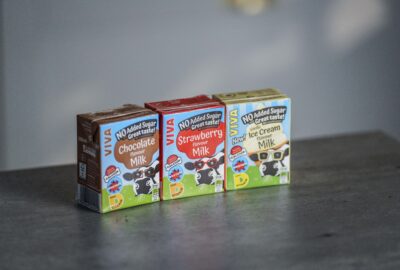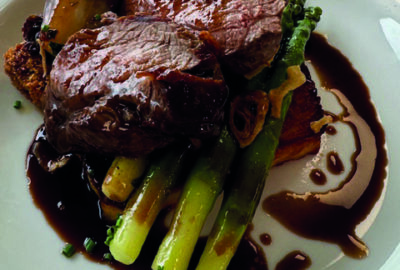Recognised as the legendary Italian who taught Jamie Oliver all he knows about Italy’s cuisine, Gennaro Contaldo is one of the UK’s best-loved chefs, author of a dozen best-selling Italian recipe books and TV personality, featuring on shows such as Saturday Kitchen and Two Greedy Italians. We caught up with Gennaro to discuss the state of play in the industry, mentors, beating the rising prices and his latest book – Gennaro’s Cucina.
How do you think the hospitality industry and the life of a chef has changed in the last few years?
It has changed immensely and all for the better. Technology has greatly improved the bookings and ordering systems; kitchen equipment has improved making laborious tasks more efficient and timesaving; ingredients are more easily accessible.
Chefs have better work conditions with more time off, there is more recipe sharing and the profession has gained more respect. It is still hard work being a chef but it is more rewarding and there are so many opportunities, especially in London and the big cities where there is a wealth of different cuisines, styles and trends.
What do chefs and businesses need to do to survive and thrive in the next year?
It certainly has been a challenging couple of years for restaurants and things are not going to get any easier. But it certainly isn’t the end for restaurants, people still want to eat out. Seeing how resilient they were during the pandemic and how they adapted to change, I’m sure the same will happen now. Restaurants and chefs have to be flexible – look at your menu, see what works and what doesn’t, reduce the number of dishes and ingredients, perhaps cut back your wine lists if necessary. Reach out to your customers, ask what they want and reach out to new customers – social media is a powerful tool, it’s free, so use it! Offer takeaways alongside seated customers so people have the choice to dine in or at home.
Are there any tips you can give chefs to beat rising prices?
Buy local as much as possible and in season, it’s cheaper and more sustainable. Use ingredients wisely, maybe cutting back on certain luxury items if you can. Befriend and be loyal to your suppliers and they in turn will offer you the best deals. See what offers they have and be creative in making beautiful dishes with what’s available.
Try not to over-order, but if you do, then create something wonderful with it and serve it as a “special of the day” or use it to feed the staff – they deserve to eat well too! Try to lock in good deals with energy suppliers, shop around. Small changes help too – switch off the gas hobs when not using (chefs are notoriously bad at leaving them on!) buy energy-saving lightbulbs, etc, etc – small changes can make a big difference to your overall bills.
Look at your trading times – if there’s a day or time which is not profitable then rearrange your schedules. You have to have an open mind and be flexible.
What is your favourite dish for Easter?
I love making Pastiera di Grano – it’s a sweet tart from Naples and the Campania area dating back to Pagan times when Neapolitans offered the fruits of their land to the mermaid, Parthenope, during spring – eggs for fertility, wheat from the land, ricotta from the shepherds, orange-flower water and vanilla to symbolise faraway countries and sugar in honour of the sweet mermaid. In return she would take these ingredients, immerse herself in the sea of the Bay of Naples and give back to the Neapolitans a dessert that symbolised fertility and rebirth.
I make several each year for family and friends. I use pre-cooked wheat which is sold in jars from good Italian delis and suppliers, and this is mixed with ricotta and the other ingredients and filled in a sweet-pastry case. Easter just wouldn’t be the same for me without this traditional dessert.
Tell us about Gennaro’s Cucina?
The book is based on the basic principle of Italian cooking, the cucina povera, which is how I and most Italians grew up eating. It’s taking the few ingredients which people had available to them and making them into beautiful dishes. It was making use of all food – nothing was ever wasted – every part of the animal was used and lesser cuts of meat slow-cooked for maximum f lavour; vegetables were f illed to make them go further; stale bread was never binned and always used up either as a filling for meat and vegetables or made into breadcrumbs to top pasta dishes. In Cucina you will find lots of recipes to inspire you to turn a few simple affordable ingredients into delicious nourishing meals.
What advice would you give to your 16 year old self?
That the food I ate as a child was really amazing and there is no better way than eating what’s in season.
What are your favourite dishes or cuisines?
I like all food as long as it is well cooked with love and care. I love a good curry, ramen and Chinese food, it’s so different from Italian food and once in a while it makes a pleasant change.
How important are mentors for young chefs?
Aside from formal college training, which is very important especially these days, I think it’s beneficial for young chefs to have a mentor if they can; someone who can pass down invaluable first-hand experience, and further influence a young chef’s interest and passion in the kitchen.
When I was growing up, food was all around me – my mother taught me to forage for wild herbs and mushrooms in season; my father taught me how to prepare game after a hunting expedition; the local fishermen taught me how to fish, and in which waters for the best seafood. We had freshly-made ricotta from the local farmers; my sisters, aunts and friends all cooked from scratch – fresh bread, pasta, the ritual of the preparation of the Sunday lunch ragu and so many other dishes. At the age of about 10, I started to work at a local trattoria helping out during the holidays and I loved it. I grew up in a foodie’s paradise without ever really knowing it until I was older and became a chef. When my father was alive and well into his 90’s I would often call him to ask about recipes.
What trends should we be keeping an eye on?
Sustainability of ingredients is more important now as ever, buying seasonally and making use of as much of the ingredient as possible with minimum or no waste at all. We are heading towards a more vegan diet and this is something all chefs have to incorporate in their menu. But I also believe if we raise animals more sustainably and responsibly and inform the customer where the produce comes from, meat and fish dishes can happily co-exist alongside vegan options.
What are your 3 key tips for chefs in 2023?
Be sustainable in your cooking, be creative and be flexible.
Tell us about the recipe you’re sharing with us?
Fave e Cicoria – It’s a dish which comes from rural Puglia and to me symbolises the best of cucina povera – just 2 main ingredients, very simply cooked to make a nourishing and complete meal. Dried split broad beans are available in most international shops, which are cooked and mashed. The greens used in Italy are Cicoria from the chicory family, but you can use puntarella – in spring you could even forage for dandelion! Otherwise, use mixed spring greens, long-stem broccoli or even spinach will be just as good. And if using puntarella, don’t discard the hearts, finely chop them to use in a delicious salad. Nothing is ever wasted!!



